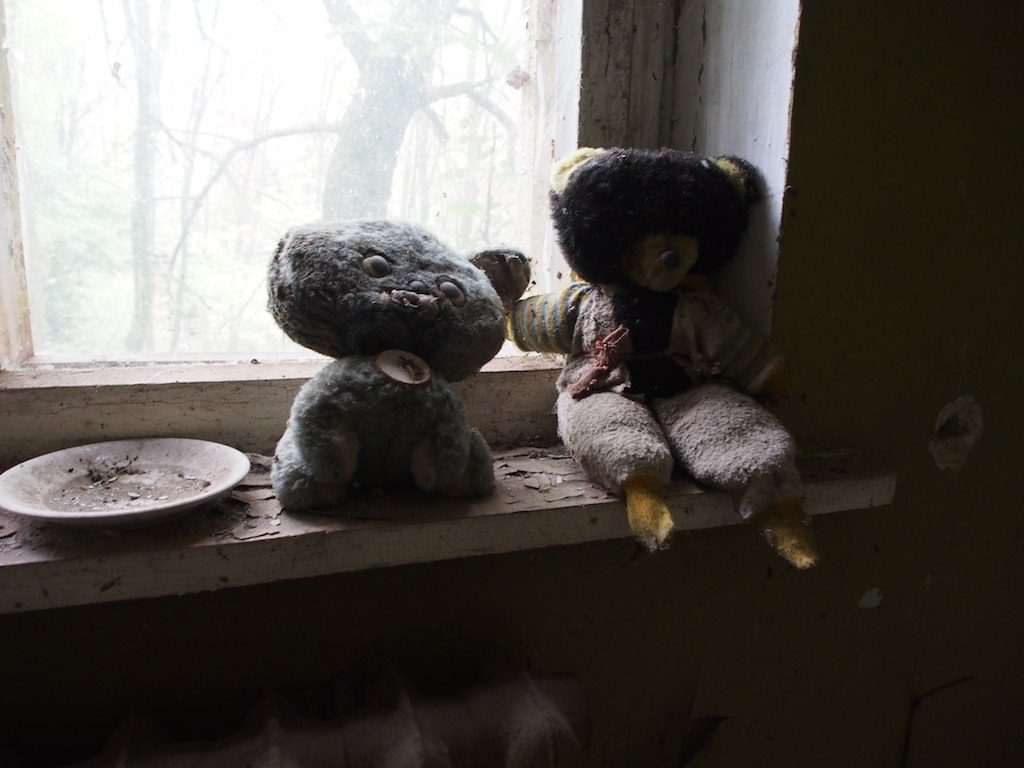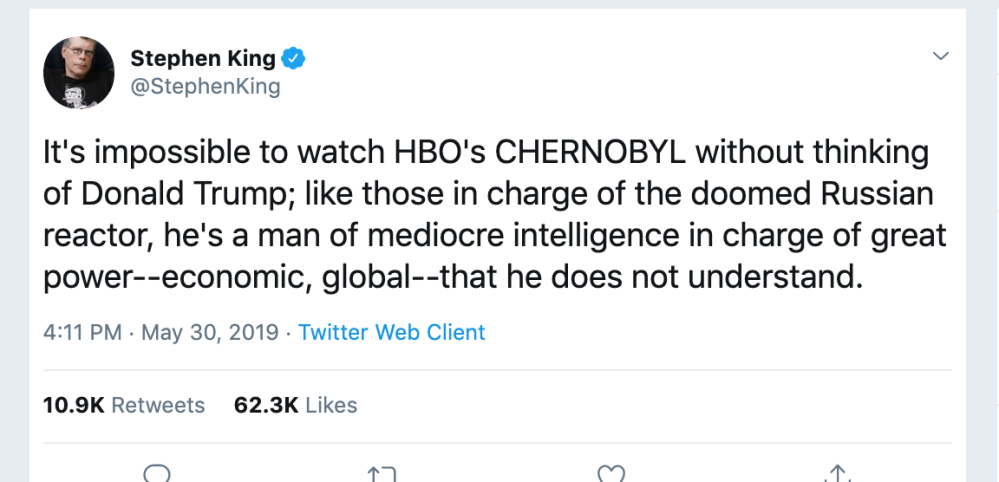
I started watching the series ‘Chernobyl’ after seeing media reports that interpreted it for an American audience. First it was the story of a woman scientist portrayed in the show confronting a bureaucrat with details of radiation and the government official ignoring her expertise. This was supposed to show us “mansplaining” and how men ignore expertise.
Then I saw discussions about how “Chernobyl’ was an illustration of “socialism” and the failure of “communism.” Articles appeared that explained how the disaster showed how lucky the world was that the Soviet Union collapsed.
Then there was Stephen King.

He claimed that the series is about Trump. In the US everything is about Trump. It is part of the increasingly insular and American-centric discussion that ignores the rest of the world and world history and, in responding to the rise of Trump, makes everything Trump-centric.
But the series isn’t about Trump, and one can watch it and never think about Trump or America. King says it is “impossible,” but it’s only impossible if you’re one of those people who simply has no interest in other languages and cultures or historical experience anywhere in the world.
For background, the series is a Sky Atlantic/HBO co-production. It tells the tale of the days after the April 26, 1986 disaster at the Chernobyl nuclear power plant, from meeting rooms in Moscow, to the evacuation of the population from an exclusion zone around the area. This initially included 45,000 people from the city of Pripyat and eventually up to 300,000 people in all.
I watched the series and several documentaries after, such as ‘The Battle for Chernobyl 2006)’. There is another called ‘Zero Hour‘ which is worth watching. Both of the documentaries are similar to the images one will see in the series.
What shocked me, having gone into the series with the tweets about Trump ringing in my ears, is how little the series has to do with America and how few parallels there are with America. I grew up in America in the 1980s. I grew up in rural Maine. Probably the area where we lived did not look different than some areas around Chernobyl. Forests. Bogs. Rivers. Rural people. We didn’t have the Soviet planning of Pripyat of course. Our society was quite different.
But the bureaucrats who haunt the story of Chernobyl are the same bureaucrats I saw in university and which I’ve seen elsewhere. I studied abroad in Russia in 1999 and in Italy in 2002. I lived in the UK for a summer. I’ve lived in Israel. And I’ve seen a lot of bureaucrats. The dramatization of the story of the woman scientist confronting some pig-headed dolt isn’t unique to the Soviet system.
What surprised me watching the film was actually how quickly the Soviets did respond and the heroic lengths they went to stop the disaster from spreading. Although initially met with denial and skepticism and a desire to hush up the reality, the locals and government did scramble to act.
The disaster began at 1:23am on April 26, 1986 when reactor number 4 blew up during a test. Firefighters arrived to put out the fire which they did not know contained deadly levels of radiation. Many would die. They arrived within twenty minutes of the explosion. One of the men said that they understood the dangers but that it was their duty.
It took a day, 11am on April 27, for buses to arrive to evacuate the city.
The Soviet system, critiqued as somehow symbolized by the failure at Chernobyl, responded relatively quickly for an authoritarian state that was ossifying. The initial reports from the Ukrainian SSR did seek to downplay the disaster. But the commission established by the government, headed by Valery Legasov, was impressive. It included the best specialists and they flew to the power plant area the same day of the accident. The experts and officials put themselves in harms way, which is made clear in the film, knowing they might die. 36 hours after the disaster began the city was being evacuated.
Again and again heroism, including sending men into the most dangerous conditions, is what makes the series, and the real story, so amazing. Men volunteered to go into the radioactive water in wet suits to open valves. Helicopter pilots flew over the reactor to drop 5,000 metric tons of sand. Other men from the military, coated with protective suits, were sent to clear rooftops, only able to work for a minute at a time due to the danger. Miners from the Donbas were brought to instal a heat exchanger beneath the reactor.
Asked by Sky News years later one man said “Who else but us? Me and my fellow workers were brought up that way. Not that we went there to die, we went there to save lives.” The men said that they went “to save our families first and our country, of course. And in the long run it turned out that Europe was affected, and that higher radiation was registered in the Sahara desert and even in South America.” But watching the film they said it looked like an American dramatization, more like a cowboy movie.
The series raises many questions. But for those who see in it an indictment of the Soviet union, it would be interesting to know precisely where the indictment is. Before the reactor test it is clear that safety precautions and directives were ignored. But once the accident happened, what would the critics have liked the government to do faster? Could an American city of 50,000 be evacuated in a day? I remember Hurricane Katrina. How did America handle that. When did US officials, of the sort the Soviets sent almost immediately to ground zero, get to New Orleans?
I don’t discount American heroism. But the US doesn’t exactly move that quickly either. The Three Mile Island accident in 1979 is a good example. it took 28 hours for the lieutenant governor to give a conflicting and unclear statement about “everything is under control.” Eventually schools were closed and a 20 mile evacuation zone was created. 140,000 people left. They came back weeks later.
Three Mile Island wasn’t a disaster like Chernobyl, but consider the reaction of the officials and population. They didn’t move that quickly. So if this is a comparison of the greatness of the US compared to the socialist Soviet failure, where is the failure? Yes, the accident was a failure. But the response was relatively quick given the circumstances. Despite the characterization of the system as heavy on bureaucrats, there was flexibility.
The idea that the Chernobyl movie is related to “Trump” is also ridiculous. Trump may be president, but a system works based on the expertise of officials. The failures in the US system, such as during Katrina, are systemic failures, not a Trump issue. Is America less competent under Trump? Where is the evidence for that. Are Americans less heroic under Trump? The people who fought to stop the Chernobyl disaster were heroic. They may have lived in a bad system, but the people within the system did an extraordinary job with limited resources. If there is a lesson from the series it is that lesson.
This is a story of human perseverance, not about Trump or communism.
- Russia And China Move To Further Remove USD From Bilateral Trade
- Every Man For Himself: The Russian Regime Turns On Itself


3 comments
Oh, I don’t know. The government knew there was a huge problem and yet delayed evacuation. It’s the Kursk mentality again. Typical communist BS.
In the last episode of Chernobyl, Lysychenko testifies that Russia was the only country in the west that did not reject that type of reactor because it was cheap to operate, and that they had no particular safe guards against an event that was known to be a danger, because they buried the specific evidence that they had of danger, again because money. Socialists will always fail to do the job, whatever it might be, properly; and the reason they fail will always be money. So Chernobyl very much is a series about the failures of socialism. The film also documents the greatness of individual human spirits who knowingly sacrificed themselves to save everyone else, once the disaster occurred. This greatness is apolitical, and is found whenever human societies are put at serious risk. TV shows can be about more than one thing at a time. Certain people just would rather not see the first story, as it intrudes on their clown world good time.
I watched the series from start to finish in one night because the story is so compelling. It contrasts the heroism of the individuals involved (the reactor crew, firefighters, military personnel) with the bureaucrats who so wanted this not to have happened that they tried to ignore the danger until it became to great to ignore. The real story is how the system was so corrupt that it allowed the explosion to happen (the reactor was certified operational and safe even though several important safety tests had not been performed satisfactorily) contrasted with the same system’s ability to marshal the resources necessary to minimize and contain the disaster after it happened. And that required bravery and sacrifice from everyday people who were willing to risk all to save others.